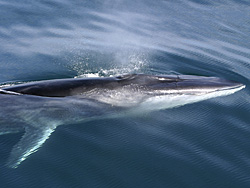Balaenoptera
|
Balaenoptera Temporal range: Neogene - recent |
|
|---|---|
 |
|
| Fin whale | |
| Scientific classification | |
| Kingdom: | Animalia |
| Phylum: | Chordata |
| Class: | Mammalia |
| Order: | Artiodactyla |
| Infraorder: | Cetacea |
| Family: | Balaenopteridae |
| Genus: |
Balaenoptera (Lacépède, 1804) |
Balaenoptera, from the Latin balaena (whale) and pteron (fin), is a genus of Balaenopteridae, the rorquals, and contains eight extant species. The species Balaenoptera omurai was published in 2003.Balaenoptera is a diverse genus and comprises all but one of the extant species in its family - the other species is the humpback whale, Megaptera novaeangliae.
This genus is known in the fossil records from the Neogene to the Quaternary (age range: from 13.65 to 0.0 million years ago).
Many fossil Balaenoptera species have been described. Some (namely "B. borealina", "B. definata", "B. emarginata", "B. gibbosa", "B. minutis", "B. rostratella", "B. sibbaldina", and "B. similis") are either nondiagnostic, highly fragmentary, or had no holotype specimen named, hence are considered nomina dubia. The species "Megaptera" hubachi may in fact be a species of Balaenoptera, and is certainly not a member of Megaptera. The valid fossil species of Balaenoptera are:
B. bertae is a relatively small species from the Upper Miocene to Upper Pliocene of California.
B. cephalus was originally thought to be a species of Eschrichtius (gray whales) or Cetotherium, but more recent analysis shows it to be a member of Balaenoptera.
B. colcloughi is known from four specimens, including four skulls and some postcranial remains, found at the San Diego Formation. It was a close relative of Megaptera novaeangliae (the humpback whale), B. siberi, and B. physalus (the fin whale).
"B." cortesii is a small species; it probably represents a distinct, unnamed genus of balaenopterid. A larger variant, called "B." cortesii var. portisi is probably also a distinct genus, and may be the same genus or species as Cetotheriophanes capellinii. The species "B. floridana" is indistinguishable from "B." cortesii var. portisi.
...
Wikipedia
